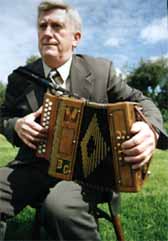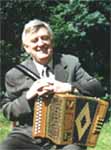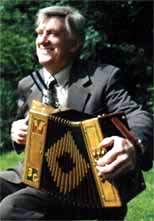An Irish Music Magazine article by Sean Laffey
A Long Road from Lisdoonvarna
Sean Laffey meets accordion maestro Bobby Gardiner.
 Bobby Gardiner's road from Lisdoonvarna has taken him many miles from his native Clare, first to New York in the 1960s and since the mid seventies to South Tipperary. A regular member of the Bru Boru troupe, a legendary box player, teacher and recording artist, his name is spoken in hushed tones by those who know a thing or two about the Irish accordion.
Bobby Gardiner's road from Lisdoonvarna has taken him many miles from his native Clare, first to New York in the 1960s and since the mid seventies to South Tipperary. A regular member of the Bru Boru troupe, a legendary box player, teacher and recording artist, his name is spoken in hushed tones by those who know a thing or two about the Irish accordion.
We met during the summer, in the lush a farmland of South Tipperary, well actually my back garden - Laffey offspring number 2 was about the come into the world, and I was housebound and waiting. Bobby now lives in Burncourt, Cahir, a base from which he makes regular trips north to Cashel and Bru Boru, and south to teach in Waterford and Cork. I began by asking about his first trip to the States in the 1960s. Bobby is a natural talker and the information flowed as effortlessly as his playing of a selection of reels.
"I went to New York around 1961, I had a brother already over there and I went to look for work, just like thousands of other young lads at the time. I got a job as a mechanic on the New York Railway and settled in well over there."
What was the musical life like in New York in those days?
"It was great, you had all those wonderful players, Paddy Killoran, Joe Cooley, Ed Reavey, Joe Derrane. The first time I heard Joe Derrane playing was on a jukebox in a New York coffee-house. I couldn't believe what he was doing on the accordion. It sounded like he was playing a continental musette system, he has such great technique, and he plays the selections in such a measured way, he's brilliant. As far as live music was concerned, New York was full of it, you could find it anywhere, and of course there was up State New York and the legendary Catskills weekends, it was a home from home for Irish musicians."
 Working for the transportation department by day, meant that his professional music was strictly part-time. However, he managed to build up a substantial engagement book, between playing for dances and session work his musical life was very busy.
Working for the transportation department by day, meant that his professional music was strictly part-time. However, he managed to build up a substantial engagement book, between playing for dances and session work his musical life was very busy.
"In those days, no matter how small the group you were playing with, and I usually worked with trios, you were always billed as an orchestra! I also did some session work for Colonial records. It all began in 1962 when I backed Paddy Killoranís sister in law Cathy McGreevey from Miltown Malbay. We'd get maybe a couple of hundred dollars for a day's work. You'd go into the studio and cut a few sides, as simple as that, no drop in or over dubs, just play it straight. We didn't even listen to the play back; the first time we'd hear what we had played was when the recording was released. The LPs must have sold well enough as they asked us back to make more. I only ever got my session fee for the recordings, we never earned any Royalties and the label owned the master tapes."
During his time in the States, Bobby joined the US Army. The demands of military transportation, and barrack life in general was pretty restricting musically. However, his weekend leave would be spent back in New York playing the dance halls or at sessions in houses and apartments. The 70's ushered in cheap air travel, suddenly it became possible to head back home for a holiday, the popularity of the Catskills weekends faded. Many musicians began to return to Ireland, at first on vacation and then on a permanent basis. Bobby too, made the trip, settling back in Ireland in the mid-70s. He recalls being astounded at how the musicians were treated back home.
"I got married in Dublinand we were going to have a few tunes after the reception, the Hotel management didn't take too kindly to it at all. Then my first gig back home came as a bit of a financial shock too. The payment was only £6, I was used to earning hundreds of dollars for dances in New York. Of course back then, it was unusual for pubs to allow Irish musicians to play. So on reflection the £6 gig was probably very good money."
 Life has been busy musically back in Ireland. His long association with the Bru Boru group has given him the opportunity to play in one of the best venues in the country, with some of the finest young players. There have been trips abroad with this group most recently to China as well as visits to Japan, Spain and Canada. He has recorded less than a handful of albums, Bobby Gardiner at Home (1979 for Releases Records), The Best of Bobby Gardiner (1982 on CCE) and The Master's Choice (1989 for Ossian). He doesn't own the master tapes to any of these recordings and has made very little money from them. "John Loessberg in Cork has been very good with the Ossian recording, it has been a steady seller and by now has just about paid for itself!" he admits with a good deal of pride.
Life has been busy musically back in Ireland. His long association with the Bru Boru group has given him the opportunity to play in one of the best venues in the country, with some of the finest young players. There have been trips abroad with this group most recently to China as well as visits to Japan, Spain and Canada. He has recorded less than a handful of albums, Bobby Gardiner at Home (1979 for Releases Records), The Best of Bobby Gardiner (1982 on CCE) and The Master's Choice (1989 for Ossian). He doesn't own the master tapes to any of these recordings and has made very little money from them. "John Loessberg in Cork has been very good with the Ossian recording, it has been a steady seller and by now has just about paid for itself!" he admits with a good deal of pride.
"We didn't even listen to the play back, the first time we'd hear what we had played was when the recording was released."
His latest CD, The Clare Shout, was recorded at his home with just one microphone on a portable DAT machine (shades of the Tommy Peoples experience here). All the accordion tracks are first takes, only the backing instruments were laid down later. It's an own label production, and Bobby is happy to have control over the process, he owns the master and will certainly get the bulk of any profits the album will eventually make. There is great freedom in an own label album, as he says himself,
"There is nobody pushing you to compromise, because they think something might sell.". It has also allowed him to use a number of different boxes on the recording, a Salterelle, a Castagnari, A Hohner, and a very rare Ludwig and Hohner Vienna Accordion.
 He is an active teacher of the box and spends at least two days a week on peripatetic duties. There is a morning in Ballylooby National School as well as day in UCC to be fitted in most weeks. Then there are the trips to Waterford and Dungarvan in particular. This part of West Waterford is becoming famous for box players, and the likes of Ciarán Galbhain and Benny McCarthy owe a lot to the influences and teaching of Bobby.
He is an active teacher of the box and spends at least two days a week on peripatetic duties. There is a morning in Ballylooby National School as well as day in UCC to be fitted in most weeks. Then there are the trips to Waterford and Dungarvan in particular. This part of West Waterford is becoming famous for box players, and the likes of Ciarán Galbhain and Benny McCarthy owe a lot to the influences and teaching of Bobby.
I asked him how does he go about teaching the accordion and how has this changed since his own boyhood days in Lisdoonvarna?
"Well when I was growing up, there wasn't the same access to teachers, you had to learn yourself, and learn fast. We didn't have tape recorders in those days, and the old players wouldn't have been over keen to show us how they got a particular sound. In my own teaching I believe you have to give everything you have, show your students your full technique. I always begin with staff notation; nowadays with so much traditional music written down it is important for young payers to have the key to the library as it were. I also teach my pupils to pick tunes up by ear, and the best payers can always do both."
Has working with other musicians altered his playing at all?
 "Oh definitely. For example there has been this debate going on for years about using the basses on an accordion, Some Fleadh adjudicators say they are not needed because there are no bass lines on a whistle or fiddle." (How they square this up with regulators on the pipes is beyond me-Ed) " Others would say you have to play to the full potential of the instrument. Both teaching and working with guitarists has helped me develop my left hand technique. For about five years I have been working on a tutor, (I might get it published one day) and it has made me really think about right hand styles. Guitarists are good too, as they instinctively know about harmony, so for example I learnt to use an E drone instead of playing a full C chord, or just using parts of a chord to add more colour. Now when I was learning the box in the 1950s very few people really understood how to harmonise, and the bases themselves didn't really fit into Irish music, the tunings weren't right. Paddy O'Brien was the first person to really work it all out, and we've all been struggling ever since to catch up with him!"
"Oh definitely. For example there has been this debate going on for years about using the basses on an accordion, Some Fleadh adjudicators say they are not needed because there are no bass lines on a whistle or fiddle." (How they square this up with regulators on the pipes is beyond me-Ed) " Others would say you have to play to the full potential of the instrument. Both teaching and working with guitarists has helped me develop my left hand technique. For about five years I have been working on a tutor, (I might get it published one day) and it has made me really think about right hand styles. Guitarists are good too, as they instinctively know about harmony, so for example I learnt to use an E drone instead of playing a full C chord, or just using parts of a chord to add more colour. Now when I was learning the box in the 1950s very few people really understood how to harmonise, and the bases themselves didn't really fit into Irish music, the tunings weren't right. Paddy O'Brien was the first person to really work it all out, and we've all been struggling ever since to catch up with him!"
Finally then, what of the future for the box?
"There are so many great young players coming forward, and so much good stuff on record for new players to aspire to. The Fleadh system is good as it sets challenges to young musicians, and whether they win or not the competitions stretch their abilities. And it is getting much easier to get hold of very good instruments in Ireland, Cairdin are making excellent boxes and Steve Chamber's of McNeill's in Dublin is always a great source, he even takes trips to the States to bring back Cajun boxes. So we have no worries for the tradition"
The Clare Shout BG007 can be ordered direct from Bobby Gardiner, Burncourt, Cahir, Co Tipperray, Ireland.
Photo Credit: All photos by Sean Laffey
Sean Laffey, author of this article, is the editor of the excellent monthly Irish Music Magazine, one of the best and most professional folk magazines around.
Back to the content of FolkWorld Articles & live reviews
To the content of FolkWorld online magazine Nr. 7
© The Mollis - Editors of FolkWorld; Published 12/98
All material published in FolkWorld is © The Author via FolkWorld. Storage for private use is allowed and welcome. Reviews and extracts of up to 200 words may be freely quoted and reproduced, if source and author are acknowledged. For any other reproduction please ask the Editors for permission.
FolkWorld - Home of European Music

Layout & Idea of FolkWorld © The Mollis - Editors of FolkWorld
 Bobby Gardiner's road from Lisdoonvarna has taken him many miles from his native Clare, first to New York in the 1960s and since the mid seventies to South Tipperary. A regular member of the Bru Boru troupe, a legendary box player, teacher and recording artist, his name is spoken in hushed tones by those who know a thing or two about the Irish accordion.
Bobby Gardiner's road from Lisdoonvarna has taken him many miles from his native Clare, first to New York in the 1960s and since the mid seventies to South Tipperary. A regular member of the Bru Boru troupe, a legendary box player, teacher and recording artist, his name is spoken in hushed tones by those who know a thing or two about the Irish accordion.
 Working for the transportation department by day, meant that his professional music was strictly part-time. However, he managed to build up a substantial engagement book, between playing for dances and session work his musical life was very busy.
Working for the transportation department by day, meant that his professional music was strictly part-time. However, he managed to build up a substantial engagement book, between playing for dances and session work his musical life was very busy.
 Life has been busy musically back in Ireland. His long association with the Bru Boru group has given him the opportunity to play in one of the best venues in the country, with some of the finest young players. There have been trips abroad with this group most recently to China as well as visits to Japan, Spain and Canada. He has recorded less than a handful of albums, Bobby Gardiner at Home (1979 for Releases Records), The Best of Bobby Gardiner (1982 on CCE) and The Master's Choice (1989 for Ossian). He doesn't own the master tapes to any of these recordings and has made very little money from them. "John Loessberg in Cork has been very good with the Ossian recording, it has been a steady seller and by now has just about paid for itself!" he admits with a good deal of pride.
Life has been busy musically back in Ireland. His long association with the Bru Boru group has given him the opportunity to play in one of the best venues in the country, with some of the finest young players. There have been trips abroad with this group most recently to China as well as visits to Japan, Spain and Canada. He has recorded less than a handful of albums, Bobby Gardiner at Home (1979 for Releases Records), The Best of Bobby Gardiner (1982 on CCE) and The Master's Choice (1989 for Ossian). He doesn't own the master tapes to any of these recordings and has made very little money from them. "John Loessberg in Cork has been very good with the Ossian recording, it has been a steady seller and by now has just about paid for itself!" he admits with a good deal of pride.
